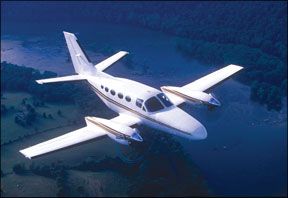The FAA sent a strong message last week that it would come down hard on operators who carry passengers for hire without all the appropriate certification or qualifications. So-called “gray charter” is cited as a major problem within the air charter industry. It is identified as operators claiming flights that are actually revenue-generating operations are misrepresented as either sales demos or some other dodge to get around the strict (and costly) federal requirements of commercial flying for hire. Legitimate charter operators have long complained that gray charter has been financially undercutting their legal operations.
The agency last week proposed more than $1.2 million in fines against five separate operators it alleges conducted the illegal flights, which it called “careless and reckless, endangering lives or property.” They include Pottco Airlease of Council Bluffs, Iowa, being charged $344,672 in civil penalties for 16 passenger revenue flights flown in a Cessna Conquest turboprop “without a required air carrier or operating certificate.” Also on the list is sister company Pottco Tactical Air, being charged $301,676 in fines for 43 flights flown in a Conquest from airports in eight Midwest states between July and November 2019. The company also lacked required personnel, including a qualified director of operations, a chief pilot and a director of maintenance, according to the FAA’s allegations. The company also “employed pilots who had not passed the required written or oral tests, competency and proficiency checks, including passing a check ride during the preceding 12 months,” the agency said.
Other companies facing six-figure fines for multiple illegal charter flights include Wikert Air and Oracle Aviation, both based in Omaha, Nebraska; and East Shore Aviation of North Charleston, South Carolina. All five companies have been in contact with the FAA about their cases.
Underscoring the importance of combating illegal charter, the rules of which can sometimes be confusing for brokers, passengers and others, the FAA is conducting an online seminar for operators, mechanics, schedulers and passengers on the topic, titled “Preventing and Identifying Illegal Air Charters—Learn How to Prevent and Avoid an Illegal Air Charter Flight”—on Monday, Aug. 23, at 19:00 Eastern Daylight Time.




































Wonder whether the recent tragic C605 crash at Truckee was a “gray charter?”
Right now just about any non commercial pilot can be fined and have their certificates revoked if they have an instructor onboard. Soon, no private pilot certificate will be valid for flight. According to the current legal (by court order) definition; paying an instructor is a ‘commercial’ operation. This is a United States District Court definition, not an FAA, or DOT definition (really a US Supreme Court decision because I can not think of a constitutional issue yet) The FAA and DOT can not change this court ruling. Not even the President of the United States can change it.
So, according to this new definition…. No private pilot can complete a biannual flight review lawfully, because it is a commercial operation and they can not act as pilot in command during the flight review with an instructor onboard…
If a private pilot lands at an airport other than the one they started from with an instructor, it is a 135 flight…
Yes, it gets that stupid.
People were bitching because Steve said it would take 4 years to fix this mess… I thing he was optimistic. The entire FAA regulation was written to separate private operation from commercial and then to further regulate commercial operation so the ignorant public might feel safe.
FAR pt 119.1(e) specifically says student instruction does not require an air carrier certificate, along with several other “work” operations.
Not true at all, Richard. As it stands, flight instruction in standard or sport category aircraft are business as usual. Standard and sport categories aren’t mentioned in the new ruling. If I choose to instruct in an experimental, primary, or limited category aircraft, a LODA or exemption is needed. LODAs are very easy to obtain, but I have no experience with an exemption.
Is it possible that the FAA might extend the ‘new’ definition of flight instruction as carrying a passenger/person for compensation to standard and sport categories? Maybe. Who knows? I’m concerned (as is the AOPA and the other alphabet organizations), but right now, I’m breaking NO law by instructing in a Cessna 172 and accepting compensation. I’m being paid for flight instruction, period.
How do I know this? I actually read the FAA documents very carefully, called my CFI insurance company, and contacted several aviation attorneys. I did NOT visit the wild-a** aviation blogiverse for information.
“I actually read the FAA documents very carefully, called my CFI insurance company, and contacted several aviation attorneys. I did NOT visit the wild-a** aviation blogiverse for information.”
Wow, you did ACTUAL research! Instead of simply searching for one dubious link that supported your knee-jerk opinion. A rare thing these days. Bravo!
As far as “gray” charters are concerned it’s about time the FAA started doing their job on this issue. Too bad the FAA can’t get all of their FSDO’s on the same page with their legal dept on pt 135 time and duty rule interpretation.